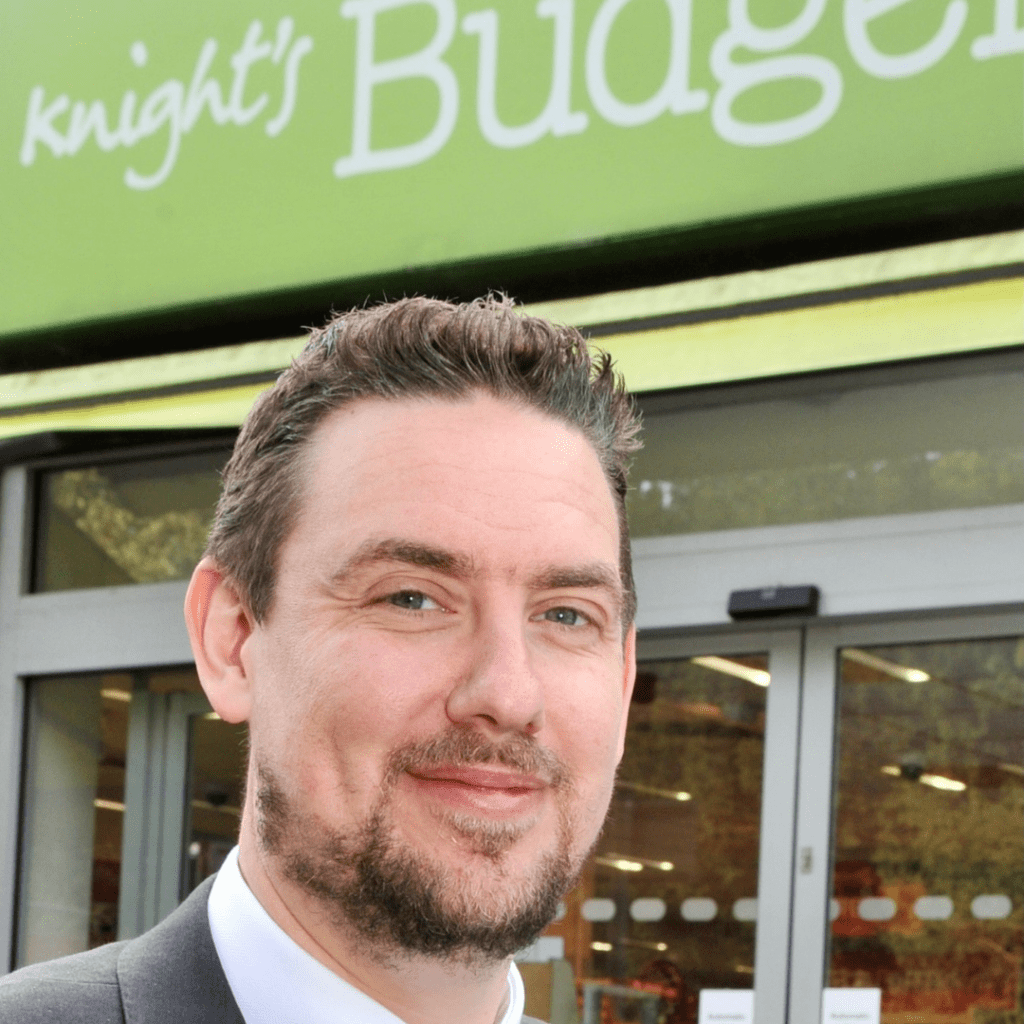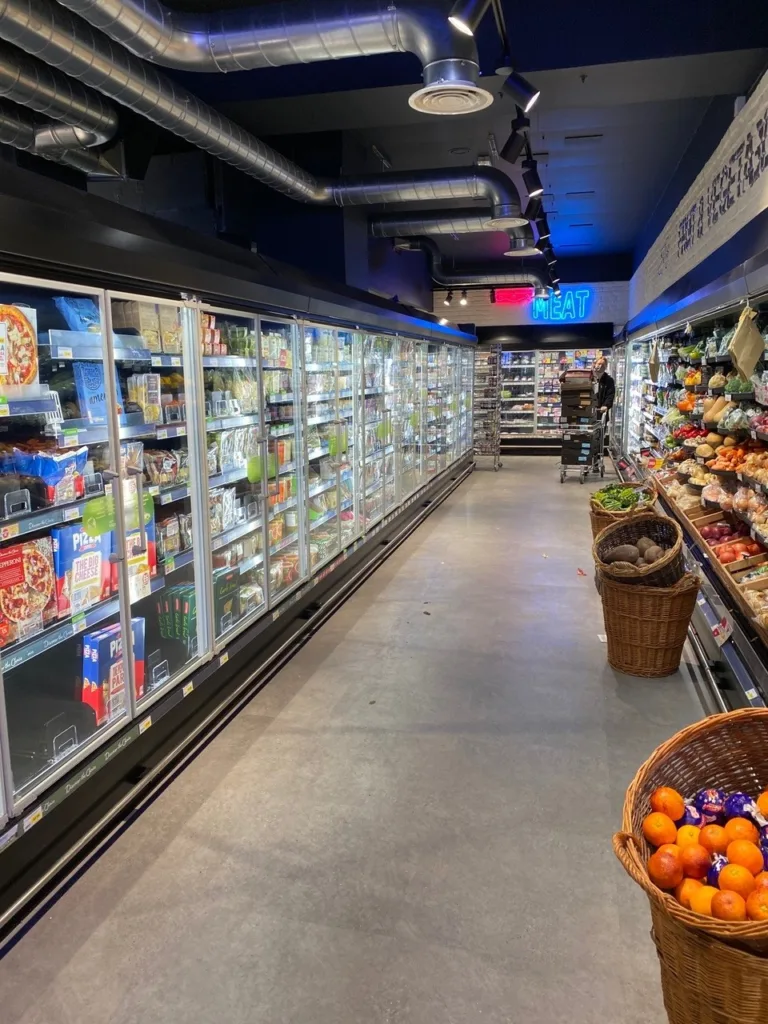
Award-winning independent retailer David Knight of Knight’s Budgens in West Sussex has pioneered the use of innovative refrigeration and heating systems in his stores, and believes these have contributed significantly to business success over 15 years.
Here, we explore how these systems are central David’s retail model.
Background
Four separate Ultra Refrigeration concepts underpin the systems. First, Ultra’s iAir eliminates the need for evaporator coils in chilled cases by ducting air directly into each cabinet. Second, a bespoke Heat Recovery system has been added to heat the store. These elements are delivered by the Integrated Power Pack (IPP) which houses the compressors and heat exchanger. Finally, the custom Smart Controller manages these elements, and more, to maximise energy efficiency and deliver the business benefits.

From concept to proof
When David took over the 4,500sq. ft. Hassocks store in 2007 it was due a refit.
“We knew it required major investment and we wanted to do something dramatically different in terms of refrigeration and energy usage. We were thinking long-term, so were prepared to invest up-front in a system which would have better pay-back, over a longer period,” says David.
Ultra’s iAir concept, unproven at the time, promised to deliver the energy savings, the operational benefits and longevity that David was looking for.
“We had an excellent relationship with Ultra Refrigeration, and we trusted in Steve Shipp and Ant Lomas to deliver the anticipated results.”
The iAir system was successfully installed in 2009 and the same equipment is still in operation today.

Living with iAir
Installing iAir is very straightforward. There is no refrigerant pipework to the cabinets so installation is quick and easy, there are fewer moving parts, and the store layout is relatively flexible.
“The operational benefits of having no evaporators or pipework on the shop floor are huge,” says David. “There are no leaks to deal with, and no aisles cordoned off while engineers with ladders fix problems. This eliminates any sales down-time, reduces the risks of customers or staff slipping and minimises engineer call-outs. And, having no coils means no wash-downs, no defrosts, no fans, no drains … all of which reduces the day-to-day tasks compared with traditional cases.”
“You really can’t overestimate how hugely beneficial these advantages are for a retail operation. Basically, you can forget that you’re living with a fridge system!” he adds.

Quantifying the energy cost savings
A further key benefit of iAir is the energy cost savings it can deliver, largely because it can provide ‘free cooling’ during periods of low outdoor temperatures.
“Precise, like-for-like comparisons are difficult when such radically different systems are compared,” says David. “When we invested in the system in 2009, we added 40% more refrigerated space to the store, so a traditional system would have used around 40% more energy. However, our energy bills have, overall, reduced slightly over the 15 years. This depends on how cold the winters are, which determines how much free cooling is available.”
“We were so pleased with the results – 40% more refrigeration for very little extra energy cost – we repeated the same formula in our two other stores,” he adds.

Adding heat recovery
Prior to a refit in 2021, David realised there were more energy savings to be achieved. At that time, store heating and hot water was delivered by an inefficient gas boiler. Ultra Refrigeration were again tasked to solve the problem. The solution came in the form of a heat recovery system, driven by an Integrated Power Pack (IPP) incorporating the heat exchanger and compressors.
“Each winter we would spend on average £3,500 – £4,000 per month on gas to heat the store,” says David. “With the heat recovery pack installed, our gas bill reduced to £500 a month to run a combi boiler for hot water only. We saw a very marginal increase of around £450 per month in electricity to run the heat recovery system. So, as a result of the heat recovery system, our net energy savings over the winter months equated to around £2,500 – £3,000 per month.”
“So, again, for heat recovery, it really is a no-brainer. We can’t understand why more retailers don’t go for it; the heat is already there and the technology is well proven,” adds David.

Smart Control
Tying all these systems together is the Smart Controller, with a bespoke program written by Ultra.
“It is completely tailored to what we want, and manages the temperatures in each case as well as the store temperature via the heat recovery system. The controller also automatically monitors system faults and ‘out of pattern’ events or trends. These are remotely reported back to Ultra who have, on occasion, turned up to fix a fault that we didn’t know we had,” remarks David.
The controller also manages the store lighting and is linked to the alarm system. All the systems can be controlled remotely, which David sees as a huge advantage. “We can make a quick call to Ultra to adjust case temperatures, or alter the store lighting, which relieves pressure on our internal teams. We also love the fact that when we set the store alarm at night, all the lights go out in the building. It’s another great way to save energy and a reliable visual indication that the alarm is set,” adds David.
Why don’t more retailers adopt these systems?
David believes that despite the obvious cost savings and longevity of these systems, traditional large retailers are blinkered in their investment appraisals.
“I think the big supermarkets, and their PLCs, see the higher initial capital costs as a barrier to investment. They’re probably looking at a seven-to-ten-year reinvestment cycle, after which they’re happy to throw all the equipment away and start again,” he says.
“Independents can look at a different payback model, and that’s certainly worked for us. We’re 15 years into our investment cycle and the equipment, because it’s well maintained, is in really good shape. During the 2021 store refurb we took the opportunity to respray the cabinets so, to all intents and purposes, they’re brand new again,” David adds.
“It’s a much more sustainable approach, and the longer the systems last the longer they generate savings for,” he says.
Summing up the benefits
“The systems, in combination, have generated massive energy cost savings over the years – and continue to do so,” David says. “But it’s not all about costs alone; there are huge operation advantages which we benefit from every day. The cases are simpler so there is less down-time. There are no condensate drains and pumps to fail. No coils to clean, no fans to replace. There’s no moisture in the cases so cleaning is so much easier. We reckon there’s around 40% less maintenance than traditional systems because of the fewer moving parts and remote monitoring that can foresee potential problems before they become a issue.”
“Because the cases have no coils, there is more room in each unit. Think about it … an extra shelf in every linear metre of case which, in retail terms, is an enormous gain.”
“I still can’t understand why everybody isn’t doing the same!” David concludes.
If you would like to discuss aspects of your existing refrigeration equipment, or want to talk about a new project, please get in touch by emailing us today at info@ultraref.co.uk or calling us on +44 (0) 330 2232404.
